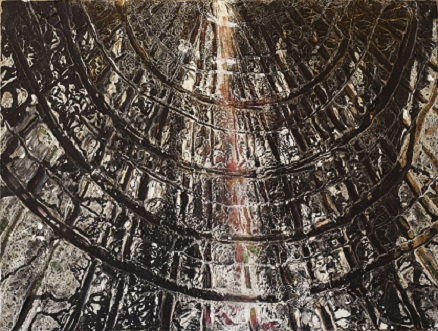I am a huge fan of sleep, of the many Huffington Post articles that have been written about it and of the initiatives that Ariana Huffington has been involved in to promote awareness of its importance. While much has been written about the physical benefits of sleep, I wanted to explore here another dimension which, depending on how you view it, is either the icing on the cake, or is the cake itself. I have in mind sleep's potential spiritual benefits, and, in particular, the mysterious role of dreams.
"Breaking Through" by Hooper Dunbar. Shared with permission of the artist, courtesy of Ethan Cohen Fine Arts, NYC
Dreams have played an important role in almost all spiritual traditions -- one thinks of the reverence of the Australian aborigines for the "Dreamtime," or the central importance of dream interpretations by Joseph in the Bible and the Quran. It is a subject that I'm sure my fellow Huffington Post bloggers and readers from various religious traditions could bring fascinating perspectives to with insights from their respective faiths, and I hope it will be explored further. Science, music and other fields have also benefited from key insights coming to people in their dreams.
So what is this mystery that takes up large portions of our night, but about which we know so little? One thing we can conclude is that it is probably important. I was thinking about the improved battery life of cellphones, iPads and laptops with each new generation, and realized that if sleep was just about recharging our physical batteries, evolution should have designed us by now to get by on far less than previous generations. You would think that by now our little battery icons would be at green and 100 percent with perhaps just 20 minutes sleep a night. But for some reason, the designers at Human Evolution Inc. don't seem to be building this into the product line. Which begs the question: Why?
Baha'u'llah, the founder of the Baha'i Faith, describes dreams as "the most mysterious of the signs of God amongst men." In a mystical work about the spiritual journey known as the "Seven Valleys," He makes the following observations about the world of dreams:
"Behold how many secrets are deposited therein, how many wisdoms treasured up, how many worlds are concealed. Observe, how thou art asleep in a dwelling, and its doors are barred; on a sudden thou findest thyself in a far-off city, which thou enterest without moving thy feet or wearying thy body ... And perchance, when ten years are gone, thou wilt witness in the outer world the very things thou hast dreamed tonight."
He goes on to ask: "What is this world, where without eye and ear and hand and tongue, a man puts all these to use? Second, how is it that in the outer world thou seest today the effect of a dream, when thou didst vision it in the world of sleep some ten years past?"
Of course, not all of our dreams are necessarily profound, just as the hours of our waking life are not all equally significant either. But the fact that we do occasionally have meaningful dreams seems to be a tip off that something important is happening in those mysterious hours. There seem to be three major categories of dreams: the first where the busy mind basically replays some events of the day without necessarily having a deeper meaning; the second where different elements of the dream are symbols which have deeper meaning; and the third -- very rare but there are instances of it recorded in history -- where spiritual guidance is given directly in a vision, without the need for symbols.
Another interesting thing about sleep is that it gives us a daily, or should I say nightly, reminder that one day our bodies will all be in a permanent state of rest. Who knows, maybe sleep is a sort of distant cousin of death; and as such it might give us a few clues about its even more enigmatic relative that we will all inevitably meet one day.
Working out the many layers of meaning to our dreams is a lifetime journey which involves much reflection and expanding inner awareness. As "spiritual beings having a physical experience," during the stillness of the night, when the activity of our physical bodies is at a minimum, our souls might have more of an opportunity to flourish, to explore, to reflect on lessons learned.
I know I have only scratched the surface of this deep topic, and would greatly welcome the thoughtful comments of all readers. What do you think? Have you had meaningful dreams in your life? Have you had guidance or solved a difficult problem because of a dream? What insights do you have from your religious tradition about the subject of sleep and dreams? I look forward to learning from all your experiences and insights.

